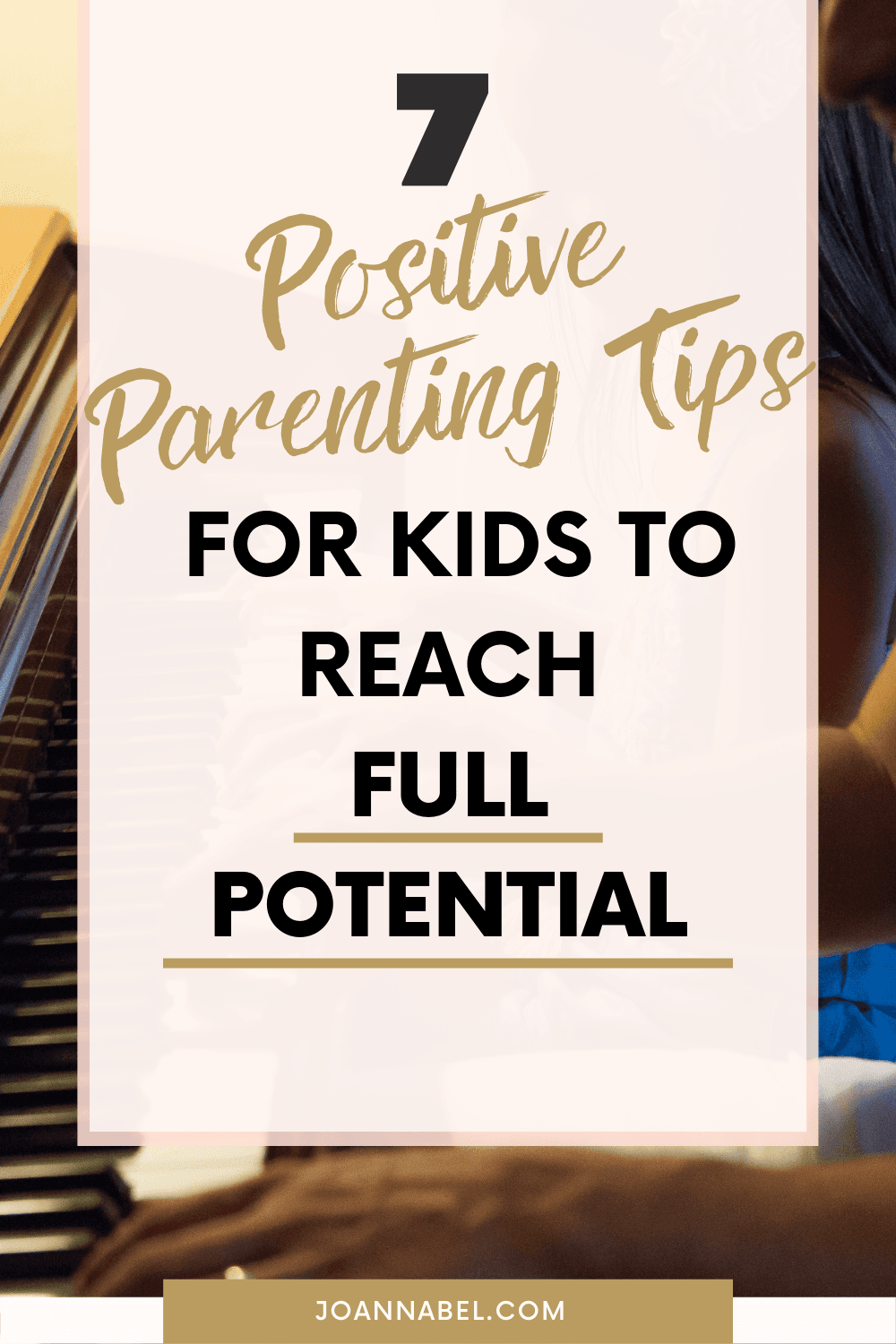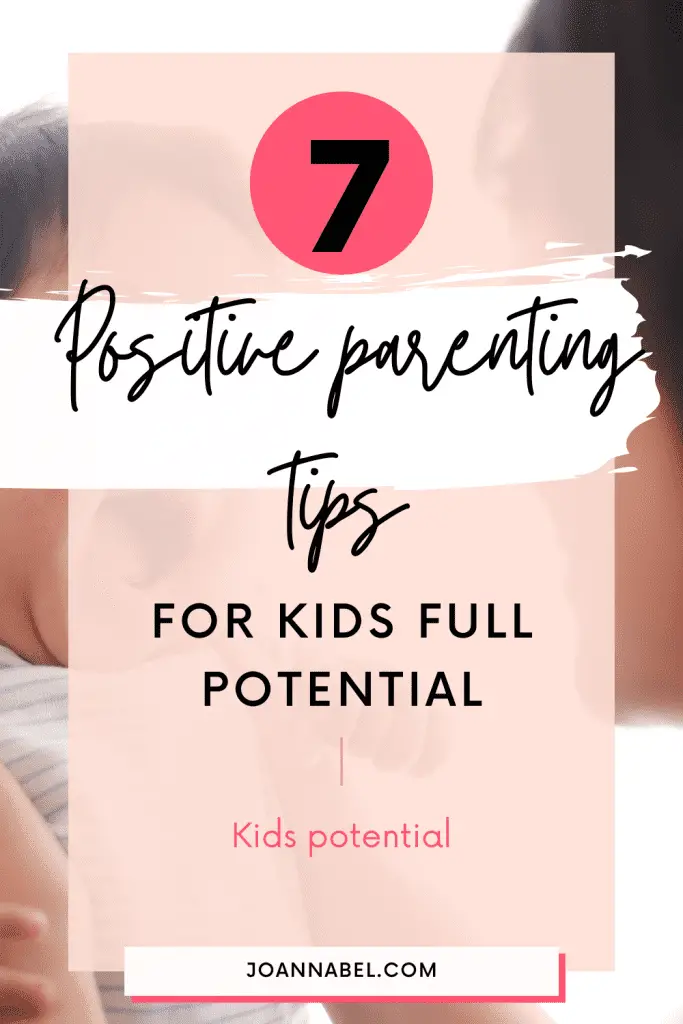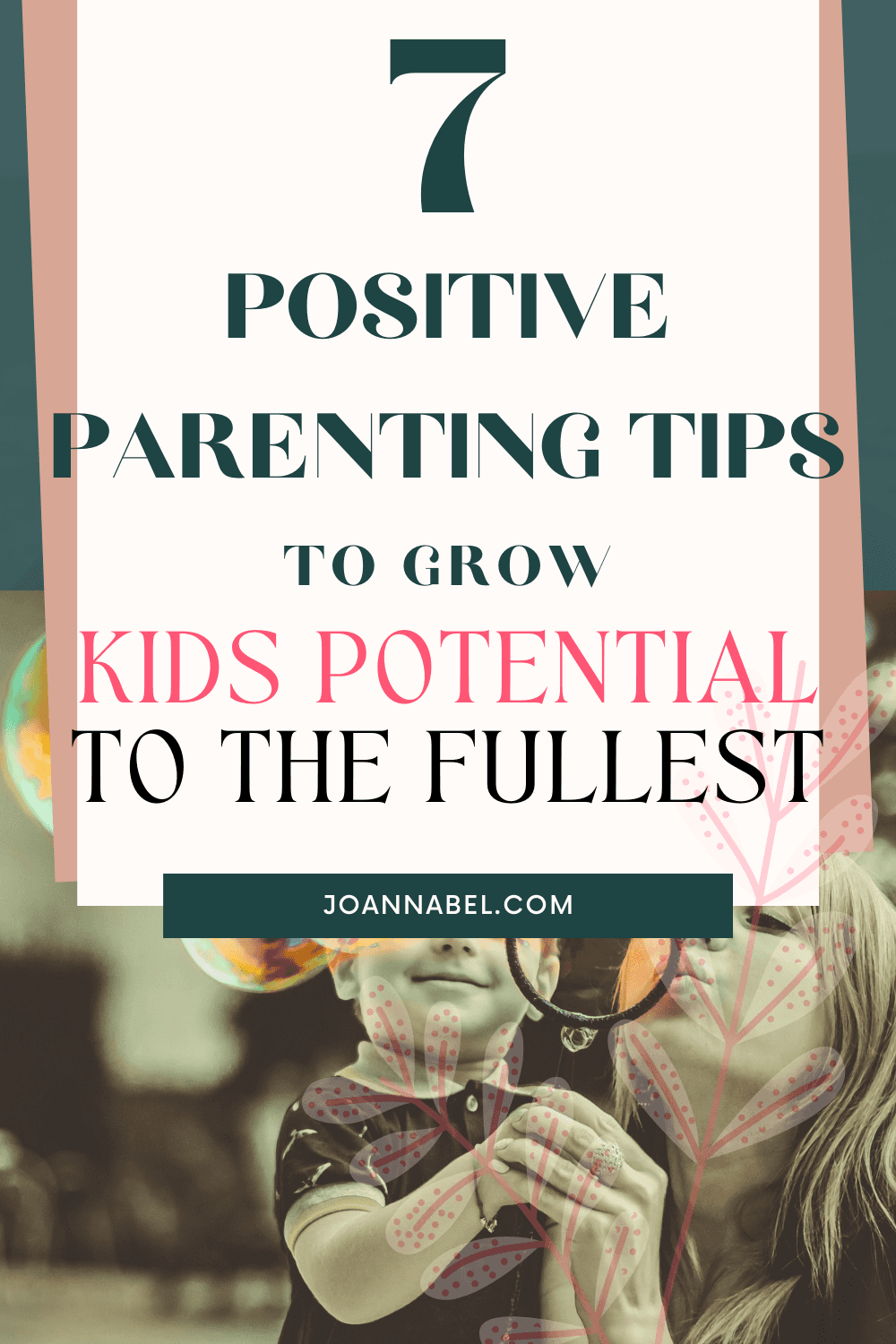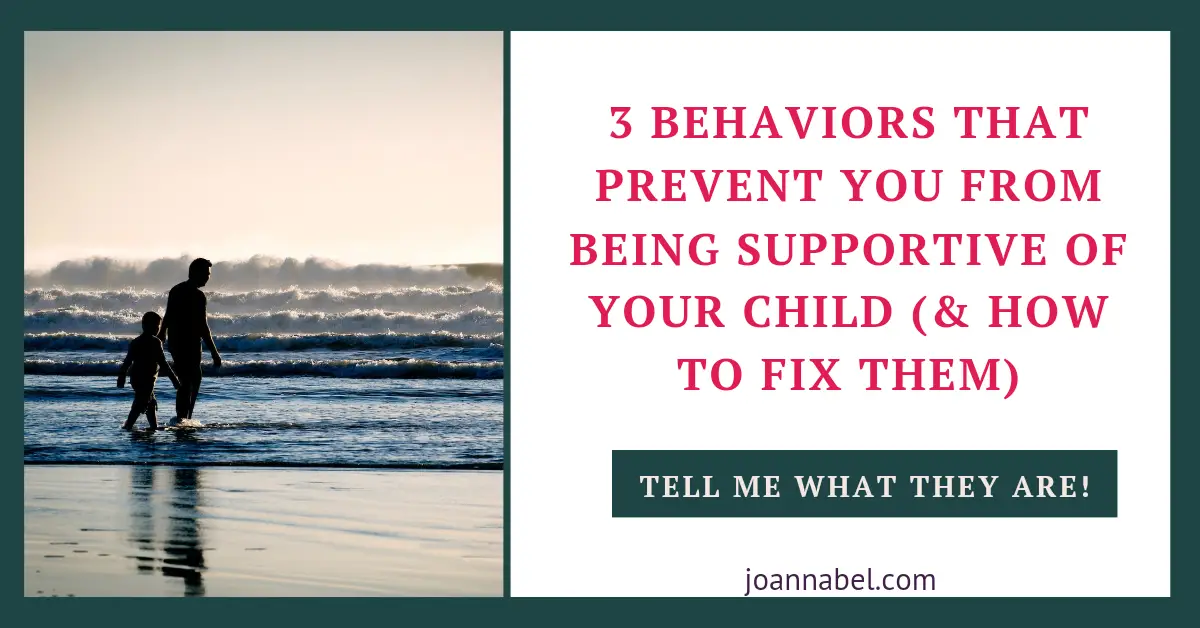Everyone is talking about how to help a child reach full potential and positive parenting nowadays, right? Do you consider yourself to be a positive parent?
If you’re not exactly sure, then you’ve hit the right web page because we’re fans of positive parenting! As well as parents who invest themselves into helping a child reach full potential.

How To Help Your Child Reach Their Full Potential – 7 Positive Parenting Rules
This post does tackle what’s considered positive parenting and who is a positive parent. But more importantly, it’ll tell you what you need to do with your parenting skills to ensure a child achieves that potential.
And considering parenting skills can be improved, that’s amazing news for any parent because it means you can have control over the process of helping a child reach full potential!
Let’s get moving on to our amazing topic of helping a child reach full potential!
Note: Although I am a Clinical Social Worker, engaging with this website does not establish a professional social worker-client relationship. The information provided here is for general purposes only and should not be considered professional advice. While we strive to ensure accuracy and reliability, this content is not a substitute for professional guidance. For specific concerns, issues, or situations, it is essential to consult a qualified professional and present your situation. Read the full Disclaimer here.
First, let’s quickly see how is a positive parent defined anyway, so we can get to the most interesting part of our today’s journey, which is raising a child with full potential.
WHAT IS POSITIVE PARENTING AND HOW IT’S RELATED TO HELPING A CHILD REACH FULL POTENTIAL
Positive parenting is parental behavior shaped by the child’s best interest and the child’s rights. But with being conscious and considerate of the parent’s position, needs, and resources at the same time.
A child’s best interest is a term from the UN Convention on the Rights of the Child and I encourage you to familiarize yourself with it if you haven’t already, of course.
Like I mentioned in the post about 12 questions you need to ask yourself to self-estimate your skills concerning child guidance, when people want to know more about positive parenting, they usually mention positive guidance.
So I emphasized the fact that positive parenting is not exactly a synonym for guidance and boundaries. But, effective guidance and boundaries are an integral part of positive parenting.

Let’s see how we define a positive parent in the shortest and most easily remembered:
- A positive parent is a parental figure who acknowledges children as competent individuals entitled to their rights. And their rights can’t be transferred to someone else or alienated.
- A positive parent leads children towards achieving their full potential while protecting them from harm and raising them in a safe environment. But WITHOUT overprotecting and stopping them from making their own choices, with evolving autonomy in decision-making.
- A positive parent is a parent who’s setting the limits for the child to help the child internalize the moral norms, and is shaping prosocial behavior in a child.
How does it sound to you? Does it resonate with what you believe is positive parenting? Let me know in the comments.
And now let’s get to how can you make sure your kid reaches the full potential we just mentioned.
HOW CAN PARENTS HELP THEIR CHILDREN ACHIEVE THEIR FULL POTENTIAL?
To help your child reach their full potential, as a parent you should:
- Be emotionally warm and responsive.
- Show support.
- Be Present.
- Set and clear out the rules and expectations.
- Put effort into understanding a child’s behavior. Point out and praise good behavior, and react to misbehavior in a nonviolent manner.
- Help children integrate their life experiences.
- Focus on reparation more than on retribution. But when using punishment are fair and righteous and never vindictive, cruel, or harmful.
And these fit the characteristics of a democratic or balanced parenting style, widely known as an authoritative parenting style. So if you’d like to know more about whether or not this is your parenting style and what effects it produces in children, I have 2 blog posts that cover that topic for you.
Read Authoritative parenting style characteristics and effects here or 5 Parenting Styles: All You Wanted to Know.
Now let’s get back to helping the child reach the full potential components we just talked about.
So even though some of them are self-explanatory, others are not, or are less mentioned but are equally important. Therefore, we should quickly get to know them better, so you’ll be able to incorporate them into your everyday life as soon as possible.
If you haven’t already, of course. Now let’s explore them together.
Let’s see who are the parents that are the best in helping a child reach full potential.
#1. BE EMOTIONALLY WARM AND RESPONSIVE
When there is emotionally warm and responsive parenting, the kids are certain they’re loved, cherished, and respected enough as a person, as human beings.
In practice, this means that you show you care with a set of different responses as well as accompanying actions, practices, and the right amount of flexibility.
As a result, you respond well to their emotions and developmental needs.
So let’s see what it takes:
- You know how to manage your emotions.
- You have empathy and understanding of their emotions and emotional needs.
- You respond to a child’s emotions properly most of the time, by accepting them, acknowledging them, and avoiding punishing children for having those emotions.
- You are able to de-center so you can understand their manner of thinking and reasoning.
- You manage to find a balance between independence and dependence according to their maturity level/developmental phase.
- You’re ‘’reasonable’’ about protection.
- You have a tendency of being honest and open with them.
- You let them have a saying about their situation and be heard and seen (participation).
- You make them feel included.
If you don’t excel at everything equally, this doesn’t necessarily mean you’re not good at parenting or that your child isn’t living a fulfilling life.
What’s important here is doing things to be even better. And considering you’re here that means that you’re doing exactly that.
You’re a good parent because of it.
Keep going.
And if you want to know more about how to put your (or other parents’) emotional responsiveness into perspective, read my post about 4 signs of emotionally responsive parenting.
#2. BE SUPPORTIVE AND SHOW SUPPORT
This one is connected to emotional responsiveness closely. And that’s because it implies having skills like empathy and de-centering we just talked about. Because how can you show real support if you can’t switch positions with those you’re trying to give it to.
But sometimes we don’t have to actually be entirely devoid of empathy, but we still might end up being non-supportive or not supportive enough at times.
This sometimes comes from fear, from the urge to protect children or any close one.
Other times our mindset is simply wrong, or we have some different emotions that are in the way of this.
You know this, you’ve probably felt it like a hundred times. If you haven’t then good for you, you’re a lucky one!
It’s easier to be judgemental because the unknown is sometimes overwhelming.

So what’s important here is to simply exercise this. Because we all can use it and need it almost always in our relationships. And it’s no different with the kids.
What’s most important is having their back. Just remember the process of teaching them how to ride a bike for example.
You encourage, motivate, and help them master doing it on their own. You carefully correct them as well as let them fail too, so they can learn from their mistakes and then become better.
But what you don’t let them is give up.
So that means you avoid being discouraging and overly criticizing. Because you don’t really want them to stop trying, to fear failure excessively, and feel paralyzed to try new things.
This will help them explore life and life’s possibilities more, become more independent, be authentic, and ”find themselves” faster.
If you want to dive a little deeper into this topic, read my blog post dedicated to helping you become a more supportive parent:
Or if you want to make sure you’re letting your children know you care the best way, check out my post How to Show Your Child You Care Quotes.
#3. BE PRESENT
Now, I must say this tends to get into an exaggeration where parents are pushed into guilt if they don’t spend every minute with their children.
I’m not saying you don’t want to spend every minute with them or that you shouldn’t.
I simply suggest a more flexible approach. Because we’re not magicians nor almighty, and we need to do other things in life, too when it’s time for them.
We have to get to work to support those kids of ours, right? And that’s just one example.
Also, we need to do things that are only for our personal needs. This is healthy for our mental health.
I encourage you to of course put your child’s needs first, so you won’t neglect the child, but also to set boundaries for yourself and others.
If you know how to take care of yourself you will be able to take care of them better. If it’s only 15 minutes a day, then be it. But set the boundaries and stick to them. Women especially need this. If you don’t set the boundaries then who will respect them if you first don’t?
You might feel guilty at first, but I encourage you to endure the pain it’s causing. It’ll get easier.
Also, your children need to see that nobody can satisfy every need they have at every single moment. You’ll contribute to their dealing with frustration.
Also, they should get accustomed to being separated from you occasionally. And you too need this. I truly believe this is beneficial to all of you.
Of course, to be present is not only a matter of physical presence. It’s the emotional presence and support, the dedication of your time and attention to children, as well as showing them you respect them and that they’re valuable as human beings and important to you.
#4. SET AND CLEAR OUT THE RULES AND EXPECTATIONS
Every family has its rules and expectations and they should be talked about, discussed, and clarified. This is important because those rules that are implied can cause misunderstandings, troubles, and all in all many headaches.
You need to make sure a kid knows them, and that you all respect them. And you need to have a set of disciplinary mechanisms and measures that you seek out when they’re not followed.
Of course, if they’re reasonable, flexible (not too strict and not too soft), appropriate by nature, and suitable for the child’s age.
A child needs to know about them too. Consistency is the key.
But also, keep in mind that you need to be flexible enough to modify the rules if they’re not good for everyone anymore.
I have a blog post dedicated to setting the rules and if you want to know how to do this the best way, I suggest you check it out. Here’s the link to it: How To Set Rules For Kids The Best Way.
Also, you need to think about whether your children understand them in a way that they find them rightful and fair. I’m not talking about classic child complaints. I’m talking about leading a child into misery.
For example, it shouldn’t create a constant filing that the parents are the privileged ones. This happens when parents ask a child to do things they don’t model and don’t respect themselves.
For example, if it’s about bad habits, the most effective way to make a progress and show your child not to do something is to go change your habit.
That’s not always easy to do, but I encourage you to make an effort for your and your child’s sake. It’s a win-win situation.

When it comes to expectations, it’s important to motivate children to achieve their goals, progress, learn, and develop to the fullest. And you can do it by setting high expectations and good structure. And to achieve this you have to support them and motivate them through this.
But of course, with thinking about rewarding them for their good efforts. As well as provide enough time to play and enjoy too.
Much more about this and the next matter we’ll get into in a sec, you can find in my post Child Guidance: 12 Questions for Parent Self-evaluation.
Or if you need an introduction to child guidance – a dimension of parenting capacity called the guidance and boundaries setting – read my blog post What is the Purpose of Child Guidance.
If you’re not familiar with the term parenting capacity and if you want to learn about the 6 dimensions of parenting capacity, then read my blog post that explores this in full detail.
Here it is – What Is Parenting Capacity And How to Find Balance As a Parent.
LIVE Q&A And Consultations with Jovana (WISHLIST)
Want a chance to get included in live weekly calls with me and get access to my expert insights, advice, recommendations, and guidance for your unique situation?
Consider signing up if you are aiming for:
- achieving tremendous child-parent relationships with the least effort possible as you learn what to focus your attention to
- attuning to healthy child development practices without losing yourself in the process and ignoring your human needs, rights, and aspirations for your life
- understanding and responding to your and your child’s needs better and carefully easing the tension between the two
- having your most pressing questions and concerns addressed and ongoing support
- getting skilled in honoring the child’s best interest in each life situation with the help of a few key rules and principles (child wellbeing, independence, autonomy, participation, and equality)
- experiencing a supportive and cooperative relationship with the other parent or a co-parent even in high-conflict circumstances
Address your doubts, concerns, and challenges, but also reflect on your situation through the experiences of others in this small and supportive community.
You’ll unlock monthly access for 60% off of my current hourly rate!
#5. PUT EFFORT INTO UNDERSTANDING A CHILD’S BEHAVIOR, POINT OUT AND PRAISE GOOD BEHAVIOR, AND RESPOND TO THE MISBEHAVIOR IN A NONVIOLENT MANNER
I’d add to put a reasonable amount of effort.
Now, this can be so hard at times, because a child can put so much resistance and defensive behavior in front of us. We might think a child is so rude but the truth can be that it’s sad and unaccepted. But also it can be that it’s resisting for the right reasons!
A child can be so obedient and we might think ”Oh my gosh what a lovely child to have or see”! But what can lie underneath the facade can be a child that’s so frightened and withdrawn because it’s so insecure or even abused.
Or you can have a mischievous child which is so curious and adventurous that you should be kissing them for it! Instead of calling them misbehaved.
So what I’m trying to say is:
- First, everything is not what it seems, so you must put a reasonable effort to explore it a little bit and see what’s really happening to your child.
- Second, you should manage your expectation and let them be a child, but with setting proper limits.
- Third, avoid violence as a mechanism of control and use positive disciplining, and use it consistently.
- And fourth, praise good behavior to reinforce it.

When it comes to setting proper limitations, it’s about making sure they know what’s considered acceptable and what isn’t. And why it is so. It’s like a map you’re giving them so they don’t get lost. They won’t know unless you teach them.
Of course, they’ll want to test the limits, feel and push the boundaries. They’re kids and so many things are new to them! Adults do it too, like all the time. This is so humane.
Also, it’s about understanding the importance of setting personal boundaries for themselves and respecting them in relation to other people.
This way you support the internalization of moral norms and strengthen prosocial behavior. More about this you can find in my post Child guidance: 12 questions for a parent self-evaluation.
And if you need more information about providng guidance for children and where is guidances positioned in child development, read my blog post: Guidance Of Parents: What Is It In Child Development?.
None of this is easy, you have so much on your plate, but I know you can do it!
#6. HELP CHILDREN INTEGRATE THEIR LIFE EXPERIENCES
First, let them have their own experiences, so you get to help them integrate them. I know you want to protect them it’s completely natural, but you need to learn how to balance this. You’ve got this!
As they evolve they have a need for more independence and you should respect that. Respect their boundaries.
This will strengthen their capability to deal with life. Also, you simply can’t prevent every inconvenience, harm, or bad experience. It’s not possible and you shouldn’t because they need to learn to cope with it, too.
This is super important because things won’t go their way always in life. So help them adapt to that. Help them deal with frustration because this will make them more social, functional, and more skilled.
Also, support them in dealing with bad experiences. If you’ve, for example, adopted a child or you’re fostering, keep in mind that you can’t save them from the experience they already have.
Nobody can rewrite their previous life story, so what you can do is help them integrate thighs, recover and move on. This will help them ‘’write’’ a better future.
And it goes for other children too.
If they need to talk it through then support them.
If they don’t find out why.
Are they feeling overwhelmed and is too painful, or it’s something else? Ask what they need and give them enough space.
You may be interested in reading also:
#7. FOCUS ON REPARATION INSTEAD OF RETRIBUTION
This one is one of those I mentioned as less common in the everyday talk about parenting, child’s needs, as well as positive disciplining, too. And I, personally and professionally, find it very important for everyone to comprehend.
And not only when it comes to kids, but adults as well. But let’s focus on the kids because it’s a completely different matter.
So what does this basically mean?
What this is really about is not rocket science, it’s pretty simple, but it interferes with our common patterns of thinking or mindset about ’’bad behavior’’ and punishment for it.
So it’s ”tricky”. We were taught there is a bad deed and there is punishment for it, what else there is, right? Or is it?
So when someone says (example): ”but why don’t you avoid the punishment and go for repairing the damage they did, or learning better ways, make up for the wrong it came out of it?”, many people would even feel offended.
So, of course, at first, they’ll sense the urge to oppose it. Because that’s more inconvenient, considering we first tend to do things in a way that’s more comfortable to us.
So many would immediately say ”hey, are you suggesting abolishing the penalty system, are you nuts’’??

So it’s the fear of the unknown talking because what it’s being said is – FOCUS on repairing the damage. Not FORGET about the punishments it’s soooo outdated.
But what I want from you and I always repeat it, is to choose an open mind instead of prejudice and fear here.
So it’s focusing on reparation, but when using punishment being fair, righteous, and never cruel and harmful.
So what it takes is taking care of the consequences and outcomes of the deeds first.
If you found the information on the blog helpful & inspirational and you feel like giving back, you can do it by clicking the donate button after entering amount you’re comfortable with. I’ll use it to create and deliver more useful content and resources like this. Thanks for your precious contribution!
WHY IT IS IMPORTANT TO FOCUS ON REPARATION WHEN YOU’RE THINKING OF PUNISHING CHILDREN
So it’s showing your child what was the outcome of their behavior – who got hurt, what will happen because of it, etc.
Communicate this to your kids, show them, let them experience it, etc. Don’t be afraid to get creative.
And then opening the space for the child to do something good about it, which will even things out. And most importantly to LEARN FROM ITS MISTAKES, LEARN THE BETTER WAY TO BEHAVE.
It’s a chance for the child to get back on track to being accepted as a good person after repairing the damage.
A person who deserves good things, second chances, hope, and the opportunity to do better next time.
At the same time it’s a chance for things, people, and relationships that got damaged, broken, hurt to get back to normal.
Just think about the situation when you were a victim of fraud, harm, or any injustice. What did you crave the most at that moment?
Also, I’m not saying sorry will cut it. I’m saying it’s asking what a side that god damaged needs now, and taking care of those needs.
And also, remember the people who tend to punish or overly punish themselves. What do you think where this came from? Why and when was this installed in their heads so know they can’t live a normal life? Because this is affecting every part of their life, they just don’t recognize it yet.

I’m not saying it’s their parents, I’m saying it’s society’s traditional way to deal with bad deeds and punishment.
Are you that person maybe? Just think about it and all I’m asking here is to try to keep an open mind.
And of course, when it comes to punishment, it needs to be balanced according to the weight of the mistake. But NEVER cruel, hateful, and vindictive.
Because the focus of your job as a parent is to teach a child to differ right from wrong, not punish it because it didn’t obey any command and rule there is.
If you need to know more about child behavior management, I have a blog post for you to check out. Here is the link.
And for those who want to dig into the right way to use punishment go to this post – What Is The Best Way To Punish A Child?.
Latest Posts:
- The Biggest Benefits Of Adopting A Dog For Your Family (5)

- How To Turn Crafting Into Family Fun Time (6 Ideas)

- Creative Ways To Play With Kids Without Technology

- How To Make Gift-Giving More Special For Kids (4 Ideas)

- How To Do A Prenup Online (What To Expect)

- 5 Strategies To Help You Make More Time For Your Family

FINAL THOUGHTS ON HELPING YOUR CHILD REACH THEIR FULL POTENTIAL
We’ve reached the end of our exploration of principles and steps for helping your child reach their full potential.
And I’m so happy that you stayed because this is a sign of dedicated parenting considering you gave your precious time to your child this way! This is a good start for any parent who engages in helping a child reach full potential.
Your child is lucky to have you!
So we’ve talked about what it means to be a positive parent and what is positive parenting in terms of using it to lead your child to their full potential.
So, if you think someone, or MANY, would benefit from it, share it or pin it!
And now to you – how do you think parents can become the best in helping a child reach full potential? Use the comment section below.
Or check out:








